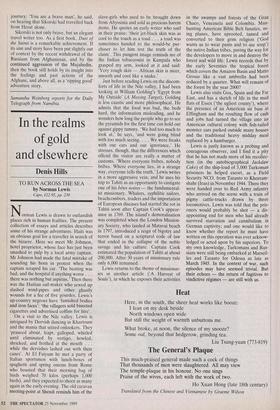In the realms of gold and elsewhere
Denis Hills
TO RUN ACROSS THE SEA by Norman Lewis Cape, f12.95, pp. 230 Norman Lewis is drawn to outlandish places rich in human frailties. The present collection of essays and articles describes some of his strange adventures. Haiti was an obvious goal for a traveller in search of the bizarre. Here we meet Mr Johnson, hotel proprietor, whose face has just been smashed to pulp by a local army captain. Mr Johnson had made the fatal mistake of sounding his horn in protest when the captain scraped his car. 'The beating was bad, and the hospital if anything worse . . . there was nothing but aspirins.' Then there was the Haitian sail-maker who sewed up slashed wind-pipes and other ghastly wounds for a fee of five gourdes. Lewis's up-country negroes have 'famished bodies and iron faces': 'the villagers sold bisected cigarettes and advertised coffins for hire'.
On a visit to the Nile valley, Lewis is intrigued by Dervish dancing in Khartoum and the mania that seized onlookers. They `pranced about, leapt, galloped, whirled until eliminated by vertigo, howled, shrieked, and frothed at the mouth . . . while the dervishes lashed out with their canes'. At El Faiyum he met a party of Italian sportsmen with lunch-boxes of spaghetti and spring onions from Rome who boasted that their morning bag of birds weighed 70 kilos (perhaps 1,000 birds), and they expected to shoot as many again in the early evening. The old caravan meeting-point at Shendi reminds him of the slave-girls who used to be brought down from Abyssinia and sold as precious harem items. He quotes an early writer who said in their praise: 'their jet-black skin was as cool to the touch as a toad . . . a toad was sometimes handed to the would-be pur- chaser to let him test the truth of the claim'. This pungent image reminds me of the Indian tobacconist in Kampala who grasped my arm, looked at it and said: `Very rough skin — African skin is nicer, smooth and cool like a snake.'
Just before reading Lewis on the discom- forts of life in the Nile valley, I had been looking at William Golding's 'Egypt from My Outside' (A Moving Target); Golding is less caustic and more philosophical. He admits that the food was bad, the beds hard, the information misleading, and he wonders how long the people who go to see the pyramids for the first time can hold out against gippy tummy. 'We had too much to look at,' he says, 'and were going blind with too much seeing. . . . We were freaks with our cars and our ignorance.' He stresses, though, that the differences which offend the visitor are really a matter of customs. 'Where everyone bribes, nobody bribes. Where everyone lies, in a strange way, everyone tells the truth.' Lewis writes in a more aggressive vein; and he uses his trip to Tahiti as an opportunity to castigate one of his bêtes noires — the fundamental- ist missionary. Whalers, syphilitic sailors, beachcombers, traders and the importation of European diseases had started the rot in Tahiti soon after Captain Cook's appear- ance in 1769. The island's demoralisation was completed when the London Mission- ary Society, who landed at Matavai beach in 1797, introduced a reign of bigotry and terror based on a scriptural code of law that ended in the collapse of the noble savage and his culture. Captain Cook estimated the population of Tahiti at about 200,000. After 30 years of missionary rule only 6,000 remained.
Lewis returns to the theme of missionar- ies in another article CA Harvest of Souls'), in which he exposes their activities in the swamps and forests of the Gran Chaco, Venezuela and Colombia. Man- hunting American Bible Belt fanatics, us- ing planes, have uprooted, tamed and converted to their grim religion (`God wants us to wear pants and to use soap') the native Indian tribes, paving the way for the developers to move in and destroy the forest and wild life. Lewis records that by the early Seventies the tropical forest which covers the Amazon Basin and Matto Grosso like a vast umbrella had been reduced by a quarter. What will remain of the forest by the year 2000?
Lewis also visits Goa, Spain and the Far East, and has a sketch of life in the mud flats of Essex (`the ugliest county'), where the presence of an American air base at Effingham and the resulting flow of cash and jobs had turned the village into an American cultural colony with fish-tailed monster cars parked outside many houses and the traditional heavy midday meal replaced by a hamburger.
Lewis is justly known as a probing and courageous observer, and I find it a pity that he has not made more of his recollec- tion (in the autobiographical Jackdaw Cake) of the ship-load of 3,000 Turkoman prisoners he helped escort, as a Field Security NCO, from Taranto to Khorram- shahr (Iran) in November 1944. There they were handed over to Red Army infantry who arrived on the scene with a train of pigmy cattle-trucks drawn by three locomotives. Lewis was told that the pris- oners would probably be shot — a dis- appointing end for men who had already survived starvation and cannibalism in German captivity; and one would like to know whether the report he must have written on this operation was ever acknow- ledged or acted upon by his superiors. To my own knowledge, Turkomans and Rus- sians were still being embarked at Marseil- les and Taranto for Odessa as late as March 1945. In the context of war, such episodes may have seemed trivial. But their echoes — the return of fugitives to vindictive regimes — are still with us.










































































 Previous page
Previous page